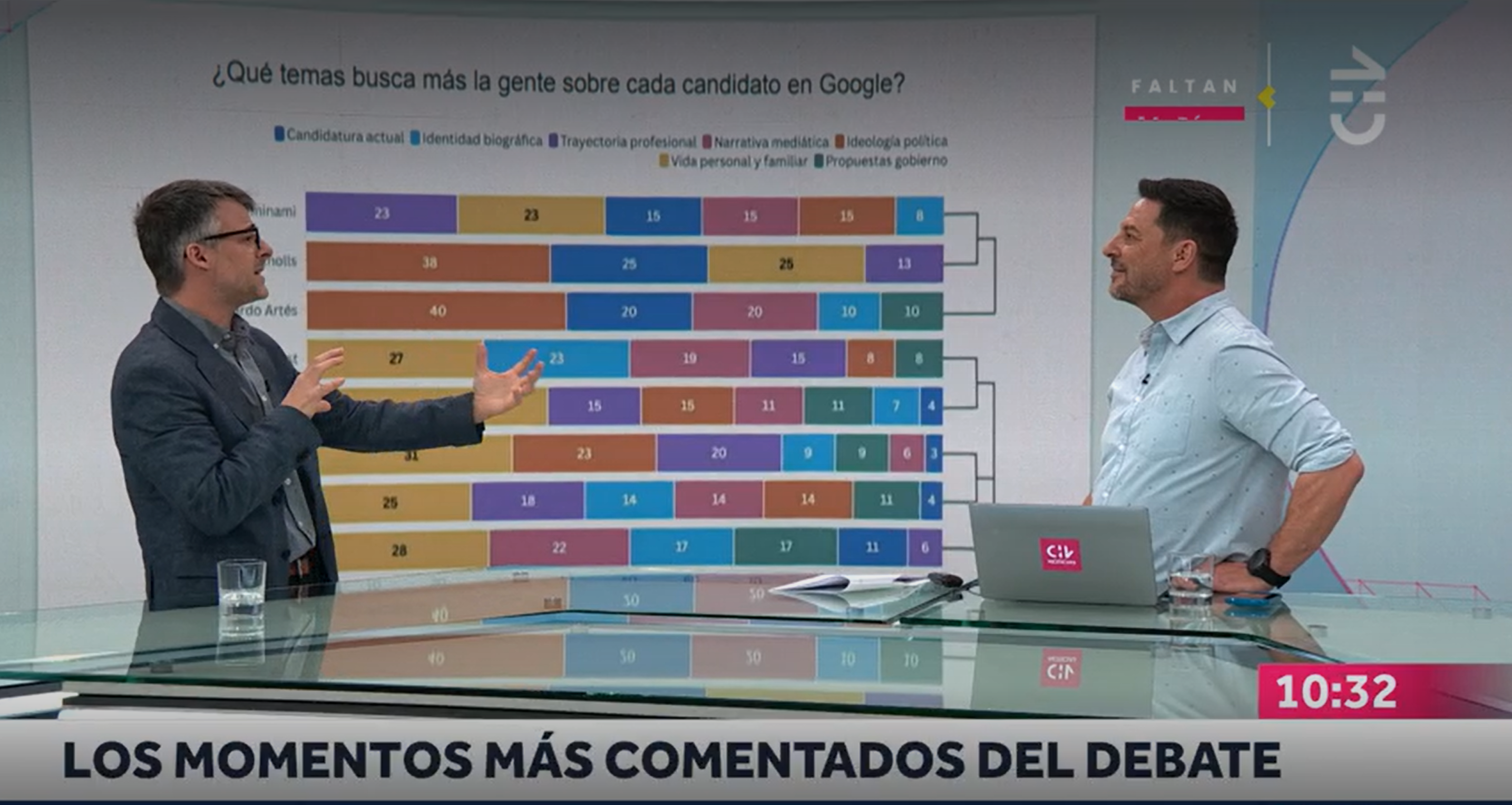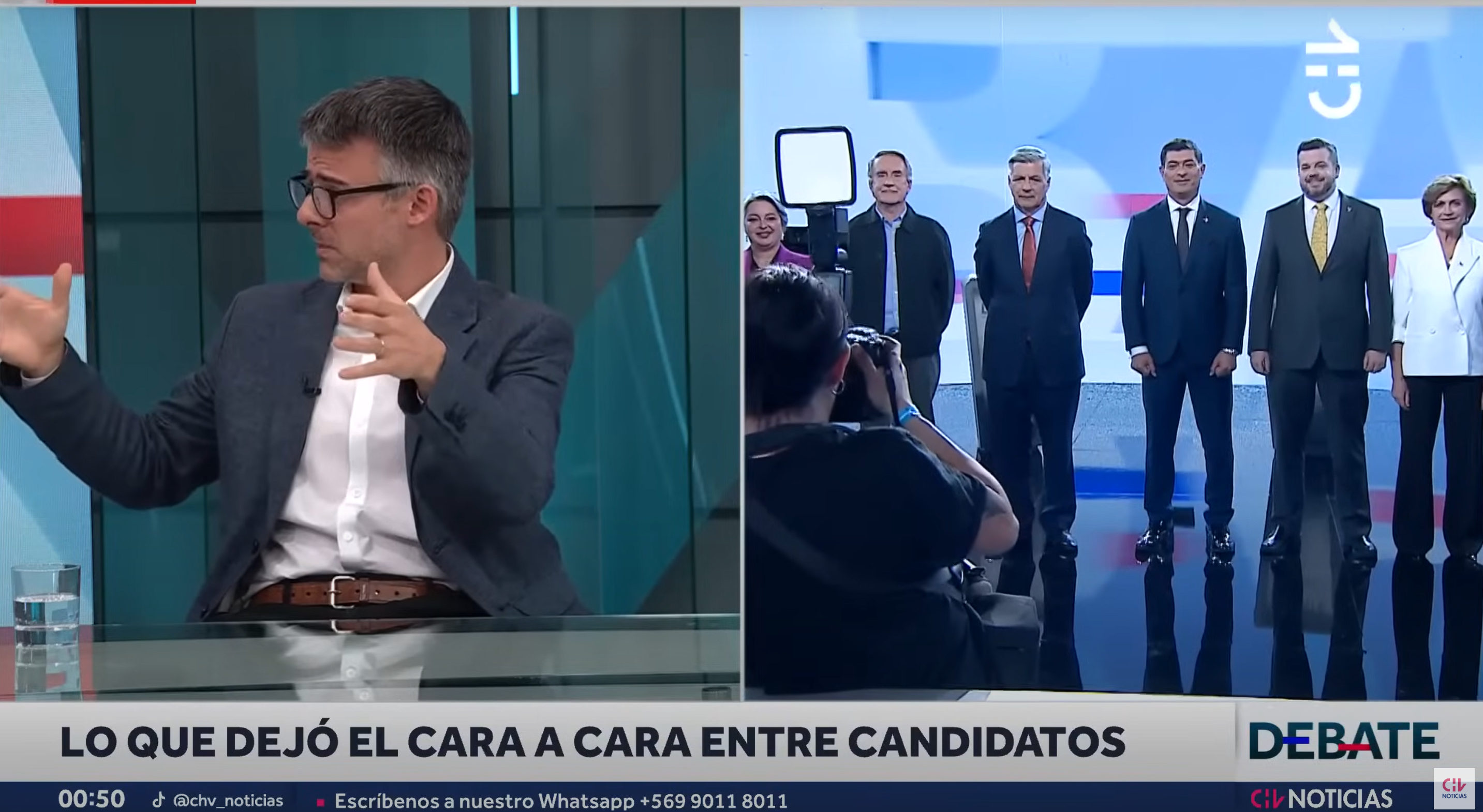I am an academic, consultant, and entrepreneur specialized in computational social science and digital society. With more than 15 years researching and teaching at the intersection of social sciences, computer science and humanities, I am dedicated to studying sociodigital phenomena (e.g., platforms, public attention, discourses, social memory, AI) and helping organizations to improve their social tuning through real-time information tools.
I transform digital information in
cultural understanding.
Timeline
Since 2022 | Adjunct Professor, Institute of Sociology – Universidad Católica de Chile. Courses: Digital Sociology, Computational Social Science.
Since 2021 | Co-founder and CEO, Monitor Social (social analytics technologies based on digital data).
2025 - 2025 | Professor, Schoof of Communication – Adolfo Ibañez University
2017 - 2024 | Doctoral candidate, Department of Social Sciences – Humboldt University of Berlin.
2021 - 2023 | Research Fellow, Weizenbaum Institute for the Networked Society (Germany). Research group: Quantification and Social Regulation.
2021 - 2023 | Visiting researcher, WZB - Berlin Social Science Center (Germany). Research group: Politics of Digitalization.
2021 | Associated Researcher, Alexander von Humboldt Institute for Internet and Society (Germany).
2020 | Senior Fellow, Alexander von Humboldt Institute for Internet and Society (Germany). Research program: Knowledge & Society.
2019 | Visiting Fellow, Centre for Interdisciplinary Methodologies – The University of Warwick (United Kingdom).
2018 - 2021 | Guest Researcher, Berlin Graduate School of Social Sciences (BGSS) – Humboldt University of Berlin.
2015 - 2017 | Adviser, Undersecretary of Crime Prevention – Ministry of Interior and Public Security, Chilean Government.
2014 - 2016 | Lecturer, Institute of Sociology – P. Catholic University of Chile. Course: Poverty and urban segregation.
2013 - 2014 | Director, Social Research Center of the NGO TECHO-Chile.
2012 | Visiting Researcher, Hamburg Institute for Social Research (Germany).
2011 | Research Assistant, Institute of Public Policies, Diego Portales University – Faculty of Economics and Business.
2011 | Lecturer, Institute of Sociology – P. Catholic University of Chile.
2008 - 2010 | Teaching Assistant, Institute of Sociology – P. Catholic University of Chile.
Awards & honors
Summa cum laude | Ph.D. in Sociology (2024).
Humboldt University of Berlin.
Start-up mentor.
Start-Up Chile by Corfo.
Co-chair of the Wiki Workshop (2024).
World Conference on Wikimedia Foundation Platforms.
World's best digital innovation in Government and Citizen Engagement (2022).
World Summit Awards | United Nations recognition for the best digital innovations (with Monitor Social).
Honorable Mention Research Project (2019).
Summer School on Methods for Computational Social Sciences, GESIS Leibniz Institute for the Social Sciences.
Emerging Scholar Award (2018).
Communication & Media Studies Research Network, USA.
Summa cum laude | Master of Arts in Philosohy (2016).
University of Chile.
Summa cum laude | Master of Arts in Sociology (2011).
P. Catholic University of Chile.
Grants & scholarships
2025 | Faculty Research Grant - Lingnan University, Hong Kong (China). For research on digital music and country well-being.
2023 - 2024 | Wikimedia Research Fund - International Fund for Research on Wikipedia
2023 - 2025 | SICSS Host Partnership - Grant to organize the Summer Institute in Computational Social Science (SICSS) in Chile, supported by the Social Science Research Council (USA).
2023 | Start-Up Chile (with Monitor Social) - Technology Entrepreneurship Program from the Chilean Government (Chile)
2019 | Full Scholarship to participate in the Summer Institute in Computational Social Science (SICSS-Oxford), founded by the University of Oxford, the Russell Sage Foundation, and the Alfred P. Sloan Foundation.
2017 - 2021 | DAAD – Becas Chile Full Scholarship for doctoral studies in Germany.
2014 | CONICYT Scholarship (Chilean Government award) for Master's studies in Chile.
Education
 Ph.D. in Sociology (summa cum laude) - specialization in computational social science, Humboldt University of Berlin
Ph.D. in Sociology (summa cum laude) - specialization in computational social science, Humboldt University of Berlin
 Leaders in Development (public policy program to manage development processes), Harvard Kennedy School of Government
Leaders in Development (public policy program to manage development processes), Harvard Kennedy School of Government
 Master of Arts in Philosophy (summa cum laude), Universidad de Chile
Master of Arts in Philosophy (summa cum laude), Universidad de Chile
 Master of Arts in Sociology (summa cum laude), P. Universidad Católica de Chile
Master of Arts in Sociology (summa cum laude), P. Universidad Católica de Chile
 Sociologist, P. Universidad Católica de Chile
Sociologist, P. Universidad Católica de Chile

 Ph.D. in Sociology (summa cum laude) - specialization in computational social science, Humboldt University of Berlin
Ph.D. in Sociology (summa cum laude) - specialization in computational social science, Humboldt University of Berlin
 Leaders in Development (public policy program to manage development processes), Harvard Kennedy School of Government
Leaders in Development (public policy program to manage development processes), Harvard Kennedy School of Government
 Master of Arts in Philosophy (summa cum laude), Universidad de Chile
Master of Arts in Philosophy (summa cum laude), Universidad de Chile



























.jpg)
.jpg)
.jpg)

.jpg)
.jpg)